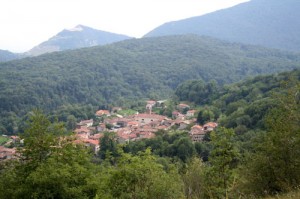Poetry in Translation (CXXIX): Pier-Paolo Pasolini (1922 – 1975), Poet Italian de expresie Friula – “Ciant da li ciampanis”, ” Sunet de clopot”, “Song of the Church Bells”
Ciant da li ciampanis
Pier Paolo Pasolini (1922-1975)
Co la sera a si pièrt ta li fontanis
il me país al colòur smarít.
Jo i soj lontàn, recuardi li so ranis,
la luna, il trist tintinulà dai gris.
A bat Rosari, pai pras al si scunís:
jo i soj muàrt al ciant da li ciampanis.
Forèst, al me dols svualà par il plan,
no ciapà pòura: jo i soj un spirt di amour
che al so país al torna di lontàn.
Sunet de clopot
Pier Paolo Pasolini (1922-1975)
Când seara se reflectă în fântână
tot satul se dizolvă-n umbre pale.
Iar broaştele din lac işi cânta corul,
sub clar de lună şi refren de greieri.
Când văile se fac ecou de clopot
tot surd rămân, mereu, la al lor zgomot.
Străine, nu- ţi fii teamă de-al meu pas
căci peste culmi, cu dor mă-ntorc în sat
sătul de viaţa tristă de pripas.
(Rendered in Romanian by Constantin ROMAN, London,
© 2012, Copyright Constantin ROMAN)
Song of the Church Bells
Pier Paolo Pasolini (1922-1975)
When evening dips inside water fountains
my town dissolves among muted hues.
From far away I remember frogs croaking,
the moonlight, the cricket’s sad cries.
The fields devour the Vespers’ church bells
but I am dead to the sound of those bells.
Stranger, don’t fear my tender return
across mountains, I am the spirit of love
coming back home from faraway shores.
NOTE:
It might seem reductive and even shocking, but I am convinced that he will endure only because he wrote his poetry in Friulian. Everything else will become part of literary and artistic history, despite an idolatry that for a long time has stripped him of his truest purposes by focusing on those aspects that appealed to an ideological or prejudicial reading.
In dialect, Pasolini is able to give things to us stark and bare in their purity, with a clear and precise diction, with no ambiguity or vagueness to blur meaning. The poet, as he wrote to De Gironcoli, found the way to enclose “infinity in the subject” and therefore is able to pursue at will any shadow or light that runs through it, also because his language has become an “absolute language, nonexistent in nature.” This is a note that Pasolini wrote in 1954 for the poems of La meglio gioventù, even if he developed an idea already expressed in 1942. It is evident that this is the concept of “language of poetry” which later gave rise to so many discussions and even today finds either acceptance or harsh opposition, often unmotivated.
Pasolini did not embark on the adventure with dialect just out of a whim to go against something or a weariness for poetry in Italian. In a certain sense, he was called to that adventure first of all by the primordial sounds that provided the necessary purity of style to write without dispersing anything that the word had as poetic, historical, and human experience. In his numerous writings on dialect poets, Pasolini also gives some clues to his own choices, for instance “the system of oppositions between instinct and mannerism, which would mark unmistakably” his “literary work.”
It would be very interesting to follow Pasolini in his constant relationship with his writing in dialect. We would realize, for instance, that his insistence on the years of his stay in Friuli is a way of finding at every occasion something of himself immersed in the peasant civilization to which he would have liked to belong, in order to nurse the wounds that instead remained open, as spectator of a world from which he had been essentially excluded. It is true that he entered his “linguistic uterus,” but he would never find a perfect inner harmony, the total and serene union with the “rustic life of the ‘belfry’.” In the final analysis, “the Friulian poems are the result of a creative verbal process applied to his own experiences to make them utterable beyond their obsessive limits.” Even if they do not open the new season of neodialectality, these poems are nonetheless the highest mark of an ethical and literary consciousness that was able to go beyond Decadentism and Pascoli, creating a new semantic level that was to affect other experiences. Pasolini’s dialect poetry was not a local sketch nor was it born to preserve memories, but it came to be in order to decipher the present using the distant past, with the exact aim of avoiding the equivocation of naiveté..
Dante Maffia
Source: http://userhome.brooklyn.cuny.edu/bonaffini/DP/pasolini.htm





No Comments so far ↓
Like gas stations in rural Texas after 10 pm, comments are closed.